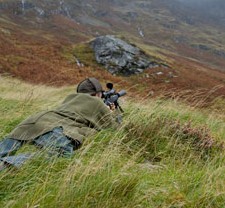 BASC highlighted the role of recreational stalkers in its written response to the Scottish Natural Heritage (SNH) report on deer management in Scotland.
BASC highlighted the role of recreational stalkers in its written response to the Scottish Natural Heritage (SNH) report on deer management in Scotland.
BASC welcomes the report’s recognition of the progress made in many areas of collaborative deer management and planning but notes that, in lowland areas, significant management by recreational stalkers – and even their cull returns – are currently unrecorded.
The SNH report, submitted to the ECCLR Committee of the Scottish Parliament, also failed to acknowledge the secondary expenditure associated with deer stalking, worth an estimated £100 million per annum.
Dr Colin Shedden, BASC’s Scotland director, said: “Deer management is currently under intense scrutiny in the Scottish Parliament, with many environmental groups wishing to move away from the current voluntary approach to a more prescribed one.
“BASC supports the current model of deer management, recognises that significant progress has been made in recent years but that further changes may be expected.”
“It is important that further recognition should be given to the current and future contributions that can be made by recreational stalkers to deer management and in reducing costs incurred by both the private and public sectors.”